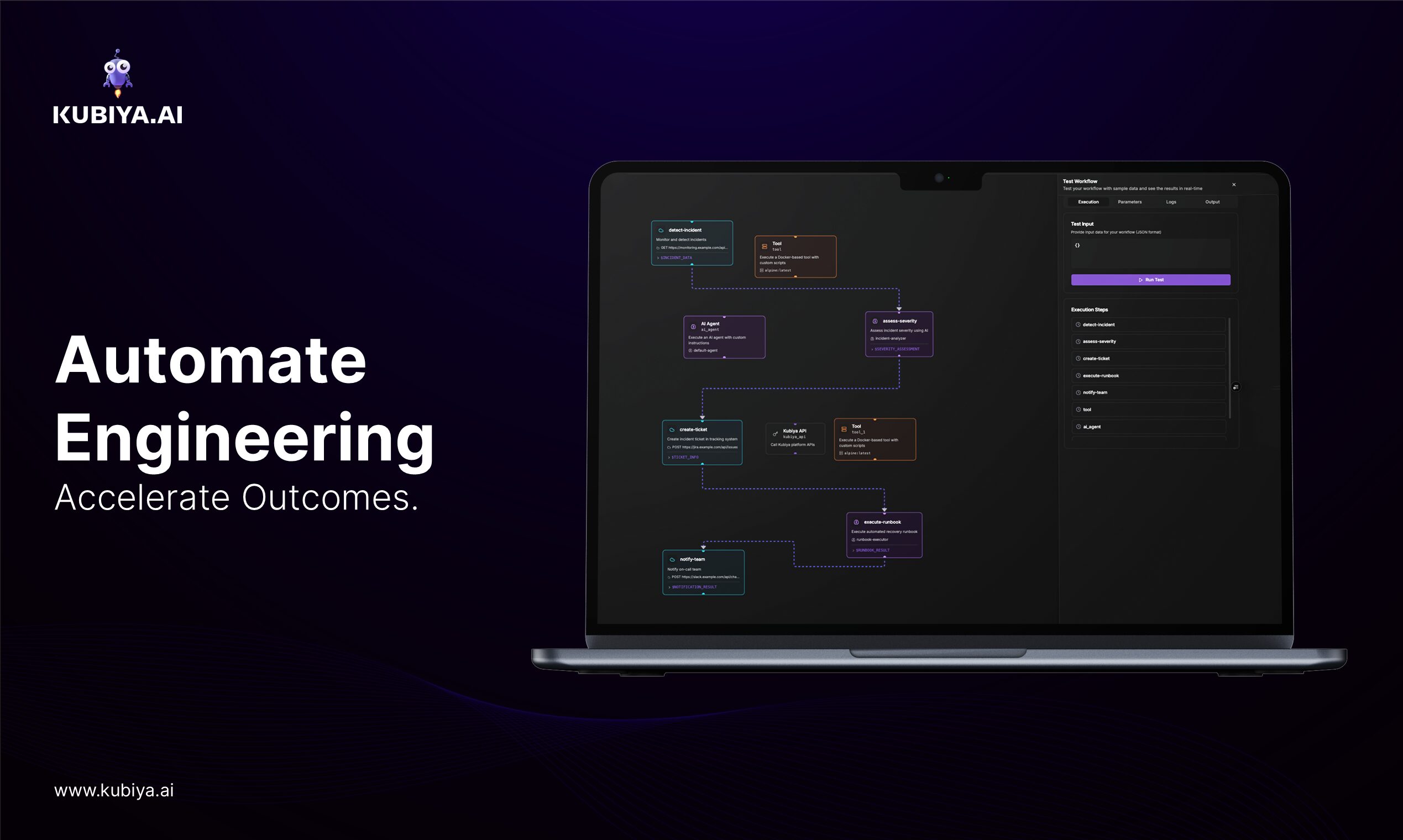Table of Contents
Overview
Production AI deployments often struggle with unpredictable agent behavior, endless loops, and lack of contextual awareness, creating significant operational risks. Kubiya Composer addresses these critical challenges by providing the first deterministic, context-aware AI platform specifically engineered for enterprise production environments. Unlike traditional AI agents that produce variable outputs, Kubiya ensures identical inputs generate identical outputs while maintaining full awareness of your infrastructure, codebase, and organizational policies. This approach transforms AI automation from experimental technology into reliable, auditable enterprise solutions.
Key Features
Kubiya Composer delivers enterprise-grade AI automation through a comprehensive suite of production-focused capabilities.
- Deterministic execution architecture: Guarantees consistent, predictable outcomes with same input producing same output 1000 out of 1000 times, eliminating the unpredictability inherent in traditional AI systems.
- Context Graph Awareness: Maintains comprehensive understanding of your infrastructure, codebase, organizational policies, and tribal knowledge, enabling intelligent decision-making based on complete environmental context.
- Zero-Trust Security Framework: Implements role-based access control, comprehensive audit logging, policy-as-code enforcement, and enterprise-grade encryption for secure production deployment.
- Composable Workflow System: Enables building, testing, and governing reusable automation components that can be combined into complex enterprise workflows.
- Developer-First SDK: Provides native SDKs in Python, Go, JavaScript/TypeScript, and Java with comprehensive API coverage and type-safe, async-ready implementations.
How It Works
Kubiya Composer operates through a systematic approach that ensures reliability and traceability in AI automation. The platform begins by analyzing your complete operational context, including infrastructure configuration, codebase structure, and organizational policies. When executing workflows, the system enforces deterministic behavior by controlling execution paths, maintaining state consistency, and providing complete audit trails for every decision and action. The Context Graph continuously updates to reflect environmental changes, ensuring agents operate with current, accurate information. Real-time monitoring and validation capabilities verify that deployed agents maintain their deterministic behavior throughout their operational lifecycle.
Use Cases
Kubiya Composer addresses critical enterprise automation scenarios where reliability and auditability are paramount.
- DevOps Pipeline Automation: Orchestrate complex deployment, monitoring, and maintenance workflows with guaranteed outcomes and complete traceability across development lifecycle stages.
- Infrastructure Management: Automate server provisioning, configuration management, and security compliance tasks with consistent, predictable results that meet enterprise governance requirements.
- Compliance and Audit Workflows: Execute regulatory compliance checks, security assessments, and audit procedures with deterministic outcomes that satisfy enterprise compliance frameworks.
- Enterprise Task Orchestration: Coordinate complex multi-system workflows involving databases, APIs, and business applications with reliable, repeatable execution patterns.
Pros \& Cons
Understanding Kubiya’s capabilities and considerations helps organizations evaluate its fit for enterprise AI automation needs.
Advantages
- Production-Ready Reliability: Purpose-built for enterprise environments with SOC2 compliance, comprehensive security controls, and scalable infrastructure designed for mission-critical operations.
- Complete Operational Visibility: Provides comprehensive audit trails, real-time monitoring, and detailed analytics enabling full observability and debugging capabilities for complex workflows.
- Enterprise Security Integration: Features zero-trust architecture, advanced authentication mechanisms, and policy-as-code enforcement that aligns with enterprise security frameworks.
- Developer Experience Optimization: Offers intuitive SDKs, comprehensive documentation, and API-first design that accelerates development and deployment cycles.
Disadvantages
- Technical Implementation Requirements: Demands significant technical expertise for setup, configuration, and optimization, requiring dedicated engineering resources for effective deployment.
- Specialized Use Case Focus: Optimized for deterministic, rule-based automation rather than creative or exploratory AI applications where variability may be beneficial.
- Enterprise Feature Complexity: Advanced security, compliance, and orchestration features may introduce complexity that exceeds requirements for smaller organizations or simpler use cases.
How Does It Compare?
When evaluating enterprise AI automation platforms, Kubiya’s deterministic approach and production focus distinguish it from development-oriented frameworks and experimental platforms.
- Microsoft Semantic Kernel + AutoGen 0.4: While Microsoft’s integrated platform offers enterprise-grade multi-agent capabilities with strong Microsoft ecosystem integration, Kubiya provides specialized deterministic execution with deeper infrastructure context awareness and zero-trust security from the ground up.
- LangChain with LangGraph: LangChain offers flexible framework capabilities for AI application development, whereas Kubiya focuses specifically on production-ready deterministic workflows with enterprise security, compliance, and observability features built into the core platform.
- Fixie.ai: Fixie.ai provides serverless cloud-based agent deployment with good scalability, while Kubiya emphasizes deterministic behavior, comprehensive context awareness, and on-premises deployment options for organizations requiring complete data control.
- UiPath Orchestrator: UiPath excels in robotic process automation for structured tasks, but Kubiya delivers AI-powered automation with natural language interfaces, contextual intelligence, and deterministic guarantees for complex enterprise workflows.
Final Thoughts
Kubiya Composer represents a significant advancement in enterprise AI automation by addressing the fundamental challenges of reliability, predictability, and security that have prevented widespread production deployment of AI agents. Its deterministic execution model, combined with comprehensive context awareness and enterprise-grade security features, positions it as a solution for organizations requiring dependable, auditable AI automation. While the platform demands technical expertise and is optimized for structured enterprise workflows rather than creative applications, it offers a compelling path for organizations seeking to move beyond experimental AI toward reliable, production-grade automation that integrates seamlessly with existing enterprise systems and governance frameworks.
